6 Outstanding features of Trust Wallet
Trust Wallet 6 outstanding features Trust Wallet's strongest point is that users can store more than 300,000 tokens and coins in the crypto-crypto market. Besides, you are allowed to transact as well as place some coins right on Trust Wallet. If you are passionate Dapps, users can learn and use them right on the Trust Wallet app. In addition, Trust Wallet is also allowed to store NFT token collections according to ERC - 721, ERC1155 standards.
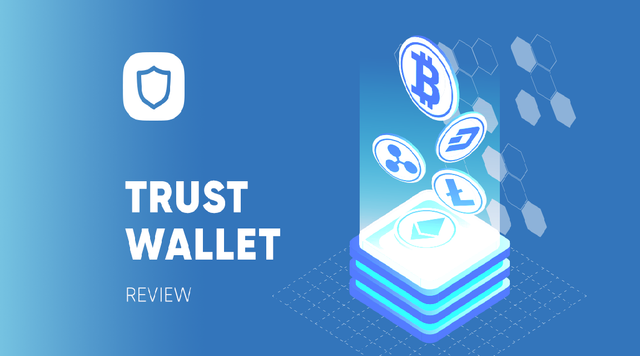
- Decentralize transaction with Trust Wallet wallet
Trust Wallet - Wallet storage
The storage feature of Trust wallet allows users to store digital assets in their wallet address instead of having to store them on an exchange wallet. As a result, investors avoid undue risk of assets when exchanges are hacked or hacked.
With Trust Wallet, you can convert or receive products right on the interface application. In terms of operations, you just need to click on the type of wallet of the asset you want to transfer, then select.
• Receive (Receive Coins): In case of Receiving Coin, you select Receive, a QR code will appear, from which the sender can scan the code and send the coin to you.
• Send (Send money to others): If you want to send money to others, choose Send, then copy the recipient's address (Recipient) in the space. The system will calculate the transaction (network fee) for you. If the system informs you in detail that your account is not enough, it means that the balance in your wallet is not enough to make the transaction.
• Copy (to copy your address): copy and target host and deliver wallet information - Staking Wallet Trust Wallet
There is a built-in staking feature, whereby, users receive interest on their idle tokens, as follows:
• TRON (TRX) $ 4.32 / year
• Cosmos (ATOM) 10, 11% / year
• Tezos (XTZ) 7% / year
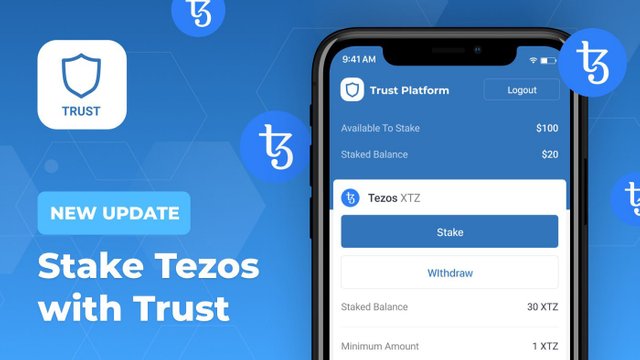
- Swap / DEX
▪ Swap the trust wallet feature that allows users to quickly convert digital assets they own into other assets for convenience. However, this service is still priced high and is not yet popular in the Vietnamese market
▪You can also check digital asset trading pairs in detail such as price, market volatility, volume, liquidity of the digital exchange pair in the most complete way. through the (Exchange) section. And you also have many more options for the type of digital asset you hold.
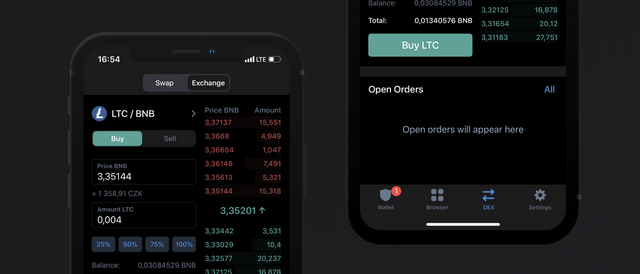
- Some other features
Trust Wallet provides the service of buying cryptocurrencies with card signals. Users can also enjoy the Dapp ecosystem with many reasonable features and utilities to have great experiences with blockchain technology. - DeFi vs Dapp
● DeFi
To keep pace with the rapidly expanding DeFi ecosystem, Trust Wallet has integrated token exchange platforms like Kyber as well as its own decentralized exchange - BinanceDEX.
The wallet's Android version has a built-in dapp browser that allows full access to the DeFi space, and a number of popular protocols including Aave, which recently improved tokenomics and Compound. It also uses an open protocol called Wallet Connect, which links DApps to a mobile wallet using end-to-end encryption by scanning a QR code.
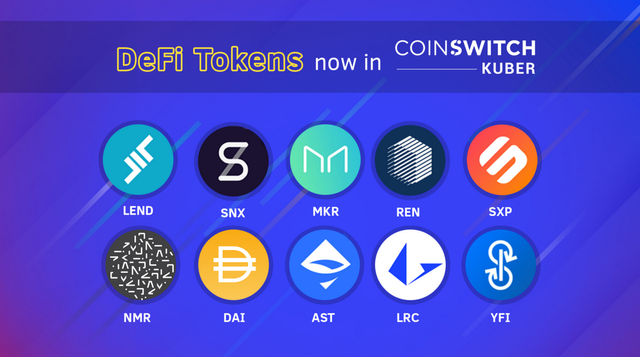
Trust Wallet founder Viktor Radchenko plans to integrate several DeFi protocols on both the iOS and Android Trust Wallet apps to increase liquidity and provide access to loan protocols and protocols. Liquidity. "The natively integrated protocol will make it more secure and intuitive for users," he said.
• Simplicity guaranteed
Speaking about the explosive growth of the DeFi sector that Radchenko said, De DeFi is booming right now. You can see the moves forward in the development of new protocols that provide more access for developers to build more financial applications on top of it. This is also a good time for decentralized protocols to build governance processes for building community-oriented protocols.
Regarding increasing user base, he added that "ensuring simplicity" is key. In addition, "adding DApp functionality that will fulfill most of the cases for crypto users over the next few years is also a priority in the future".
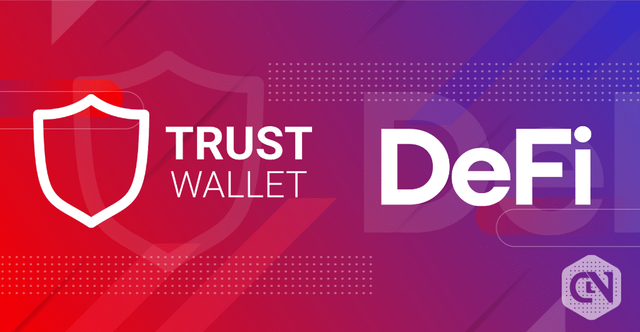
● Dapp
A decentralized application (dApp) is an application that runs on a decentralized network and uses its resources. There is not yet a specific concept, but to recognize we have the standard features of a dApp as follows
▪Open source: The first and foremost attribute is that such applications will make their core code available to everyone. Since the core characteristic of dApps is autonomy and unanimous consensus, changes have to essentially be decided by all or the majority of users. Also, the code should be available to everyone for testing.
▪ Decentralized nature: decentralized applications store everything on a decentralized blockchain or any encryption technology to save the application from the dangers of centralized government and emphasize autonomy treatment.
▪ Incentives: Since the application is based on a decentralized blockchain, the person validating the records on the network must be rewarded or encouraged with a crypto token or any form of digital asset of value.
▪ Algorithm: Decentralized application needs to have a consensus mechanism, describing proof of value in the cryptosystem. Essentially, this gives value to the crypto token and creates a consensus protocol on which users agree to create valuable crypto tokens.
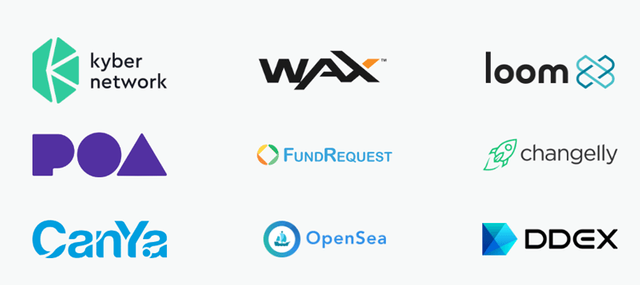
▪DApps promote decentralization that makes them tamper resistant and records cannot be changed. Since dApps are based on a secure blockchain network, such applications promote a high level of security and remain immutable from hacks and intrusions.
- Faster processing & payments without integrated payment gateway to accept money.
High level of data security due to smart contracts managed by private keys.
Greater anonymity without the need for users to follow a long registration process.
Reliable data records when users can access a public blockchain to verify transaction information
▪Ethereum is the first blockchain for dApps. One of the reasons for Ethereum's success is the technology known as the quasi-Turing Ethereum Virtual Machine (EVM). The Turing machine is a machine capable of simulating and running any computer algorithm. A piece of code for the EVM is called a smart contract. Any smart contract or dApp code can be programmed for the EVM and executed by the decentralized ethereum computer network.
The only limitation lies in the amount of computation required to complete the smart contract's algorithm.
The difference between the Ethereum dApp and a smart contract is that besides the smart contract, the Ethereum dApp includes a frontend application for user interaction. To run Ehtereum dApp in a web browser, users must install a browser extension that allows the browser to interact with the blockchain and manage user identities. Metamask is the most popular desktop solution, Trust Wallet is both for desktop and mobile.
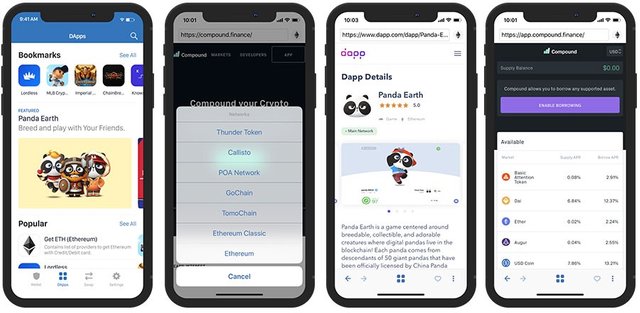
▪Since Ethereum was born, more than a thousand dApps have been created: games, gambling apps, exchanges, markets, and more. Perhaps the most famous dApp is KryptoKitties, a game for collecting and breeding pet cats. This game is so famous that it caused a significant slowdown in the network: a week after the release of the game, Ethereum's trading team increased sixfold. And the most expensive cat was sold for over 100,000 US dollars.
The most popular types of dApps on Ethereum are
Games (My Crypto Heroes, Ethermon, Lordless)
Decentralized exchanges (IDEX, Forkdelta, Kyber)
Marketplaces (Decentraland Marketplace, OpenSea)
Gambling (FCK, Win777and Etheroll)
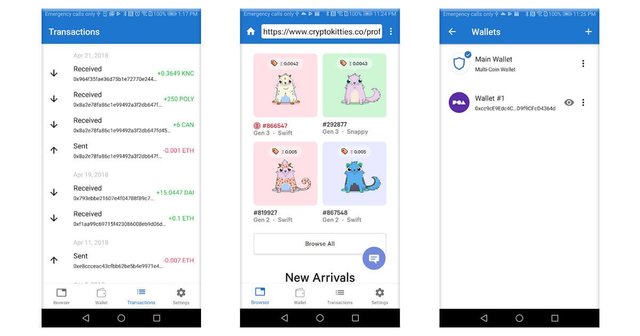
▪ Channels of media and community
https://trustwallet.com
https://community.trustwallet.com
https://twitter.com/TrustWalletApp
https://facebook.com/trustwalletapp/
https://t.me/trustwallet